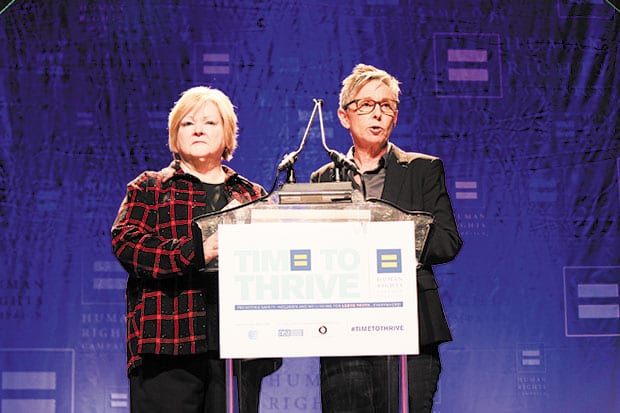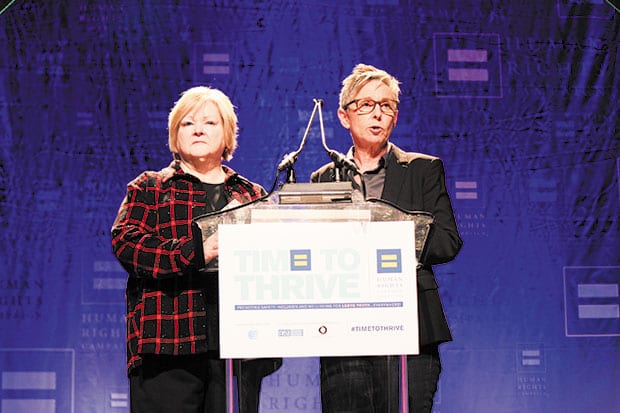Activist and advocate Judy Shepard coming to Dallas for hate crimes awareness event

Judy Shepard, left, and Ellen Kahn speak at a Human Rights Campaign event in 2014.
Tammye Nash | Managing Editor
Judy Shepard was your typical mom from Middle America — right up until the day her son Matthew was beaten, tied to a fence and left to die in Laramie, Wyoming on Oct. 6, 1998.
On that day, Matthew Shepard became perhaps the most well-known anti-gay hate crime victim in the country, if not the world. And Judy Shephard started down a path that led her to become one of the most well-known anti-hate crimes activists in the world.
Matthew was a student at the University of Wyoming in Laramie in 1998. On the night of Oct. 6, 1998, he met Aaron McKinney and Russell Henderson when all three were out at the Fireside Lounge. McKinney and Henderson offered to give him a ride home.
Instead, McKinney and Henderson drove Matthew to a remote area out in the countryside where they proceeded to rob him, pistol-whip him and torture him before tying him to a fence and leaving him there to die. News reports at the time focused on the brutality of the beating, noting that the thin young man’s face was covered almost completely in blood — except for where his tears had washed streaks down his cheeks.
Matthew was discovered some 18 hours later by a passing bicyclist, who at first thought he was just a scarecrow. He had fractures to the back of his head and in front of his right ear, and had suffered extensive brainstem damage that impaired his body’s ability to regulate his heart rate, body temperature and other vital functions. Doctors said he was too severely injured to undergo surgery.
Matthew Shepard died six days later, at 12:53 a.m. on Oct. 12, never having regained consciousness.
Matthew Shepard’s murder put his parents, Judy and Dennis Shephard, in the spotlight nationwide. And while that spotlight was a new and uncomfortable experience for them, they chose to step forward and turn their grief into action in an attempt to combat the kind of hate that had killed their son.
Judy and Dennis Shepard formed The Matthew Shepard Foundation in 1999, and Judy Shepard served as its founding president and as its executive director through 2009. She remains president of the board.
In 2007, Judy and Dennis were present when Congressman John Conyers and 171 co-sponsors introduced the federal Matthew Shepard Act that would have expanded federal hate crimes statutes to include anti-LGBT crimes. Despite widespread popular support, then-President George W. Bush announced he would veto the measure if it passed, and Congress defeated the bill.
But on Oct. 22, 2009 — 11 years and 10 days after Matthew died — Congress passed comprehensive hate crimes legislation named in honor of him and James Byrd Jr., the Jasper, Texas man killed in a horrific anti-African-American hate crime in June 1998. Judy Shephard and members of Byrd’s family were on hand six days later, on Oct. 28, 2009, when President Obama signed the legislation into law.
On Thursday, May 4, Judy Shepard comes to Dallas to participate in StayProudBeLoud, a hate crimes awareness program presented by Miller Lite and the Matthew Shepard Foundation. She will participate in a community roundtable at 3 p.m. at The Round-Up Saloon, 3912 Cedar Springs Road, along with representatives from the Dallas County District Attorney’s Office, the FBI and community organizations. She will share her own story and participate in a question-and-answer session.
The event continues at a happy hour at Cedar Springs Tap House, 4123 Cedar Springs Road, Ste. 100, from 5:30-7:30 where, organizers said, “the same material will be covered but in a much more light-hearted manner.” Judy Shepard will also speak at this event, which will be emceed by Wayne Smith.
Even with hate crime laws in place, bias-based crimes continue to plague this country and have, according to some sources, even been on the increase over the last year-and-a-half, thanks in large part to Donald J. Trump’s fear-mongering, racist, anti-immigrant, anti-woman and anti-LGBT presidential campaign and the first 100 days of his administration.
According to the most recent FBI statistics available, 5,850 hate crimes were reported in the U.S. in 2015. Of those 56.9 percent were motivated by bias based on race/ethnicity/ancestry; 21.4 percent by religious bias; 18.1 percent by anti-lesbian/gay bias; 2 percent by anti-transgender bias; 1.3 percent by disability bias and 0.4 percent by gender bias.
Transgender people, especially transgender women of color, have been targeted in ever-more-alarming numbers in recent years. In 2016, a record 27 transgender people were murdered. At least seven trans women have been murdered this year.
And a string of attacks in the Oak Lawn area that began in early September 2015 remains unsolved, leaving the community angry and on-edge.
This article appeared in the Dallas Voice print edition April 28, 2017.




